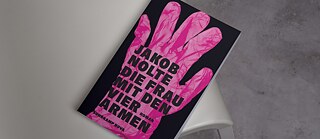Rita Aitzinger's very first appearance: detective inspector – in Hanover of all places. She swears, loves motorsport and has to solve a series of murders of young men. Jakob Nolte, theatre and novelist, presents his first crime thriller: funny, sad, full of allusions.
“It was the first time since Expo 2000 that things that happened in Hanover interested the rest of the republic ...” This is written almost at the end of Jakob Nolte's crime thriller Die Frau mit den vier Armen (The Woman with Four Arms), which the publisher has labelled “Niedersachsen Noir” to attract attention. All the dead have already been discovered and the police, after taking a few wrong turns, finally find themselves on the right track.In fact, the novel begins at a typically Hanoverian pace – a wintry park landscape, an oriole singing, a woman meditating, eating banana bread, greeting the day. Then the oriole sits on the shoulder of a young man. He is leaning against a tree and is no longer breathing – the woman quickly realises. Her reaction? “Shut your mouth.” Excuse me? Why such harsh tones? Wasn't the sun salutation just practised peacefully? But that's how detective inspector Rita Aitzinger is: undisguised, emotional; one moment one way, the next another. Now the case must be solved: “Sebastian Tamm, said Rita, who killed you?”
THE SAD LIFE OF YOUNG MEN
The search leads Rita and her team first to Sebastian's parents' house, then to the places and people in Hanover and elsewhere where his everyday life took place: A shared flat, a burger joint, an opera theatre, his ex-girlfriend's flat, etc. All places where sadness, loneliness, fear of failure and capitulation reign. The people interviewed radiate this, and Sebastian was also a prisoner of his fears, longings and his half-baked attitude to life. The ex-girlfriend: “You know when you fail at something, let's say you burn a fried egg, and then you think that this fried egg is the life that burns you?” “No,” said Rita. “Sebastian was like that.” It soon emerges that another case Rita was involved in, which was never really solved, could be connected to Sebastian's death. Among various other similarities, the female perpetrator in both cases was wearing rubber gloves, red rubber gloves – see cover image.Her kind of guys
Not a male perpetrator, but explicitly a female perpetrator? To the displeasure of her colleagues, Rita made this clear at a press conference: “We're dealing with contract killings here. Sebastian Tamm and Jonas Hartung were executed. By a gentle female executioner.” And who will have to watch out until this suspect, who is thought to be of a rather rare type, is caught? Rita knows again: “Only white boys in their mid-twenties who are afraid of growing up.” One of them will be caught and almost a policeman with a cap that is too big. But then the threads come together and the showdown is inevitable – in a Mövenpick restaurant. “Feel invited”, Rita says generously to the convicted and confessed person at the end.Jakob Nolte, who has three desperate young men die in his book and has these murders solved at the end according to the rules of the genre, knows what it takes to write a thriller. But his book also sparkles in other directions. The crisis of a certain kind of masculinity is brought out in many facets. Rita puts it in her own words at one point: “You're not loved. And you don't deserve to be loved either ... You become a man when the dragon is defeated. Except that this dragon is Dax companies or the armies of fascist world powers and they seem invincible.”
In addition, the longing for relationships and closeness, and the inability to achieve this, is repeatedly emphasised by the entire cast. Even a dating app called Datingapp doesn't help that much, on the contrary.
POP CULTURE
After all, the book is teeming with extremely funny, pointed dialogues – more than can be quoted here – which sometimes even parody the typical talk of the genre, such as the ping-pong-like explanations of two pathologists.Above all, however, there are numerous (pop) cultural references: In a fictitious interview, Taylor Swift (who else?) explains the monstrosity of togetherness. The poor victims listen to sad songs by Zara Larsson, Selena Gomez, Olivia Rodrigo and co in a continuous loop – which incidentally prompted Suhrkamp Verlag to set up a corresponding playlist on Spotify. This is how marketing works. The creative writing study programme in Hildesheim is also cited by Nolte – in a seminar, students are asked to empathise with the life of the alleged murderess. Everyday tragedies as training material for the cultural sector. Certainly not just in novels. And world-class rally driver Michèle Mouton makes an appearance, at least perhaps – a reference to Rita's passion for motorsport.
Jakob Nolte's crime thriller is more than just good entertainment. The book is contemporary in the best sense of the word, promises punchline fans just as much good material as literature aficionados, and lingers longer because of its sad, thought-provoking underlying message. A genre debut cannot offer more.
Incidentally, the sentence quoted at the very beginning continues: “...apart from the cross-party disgust that some politicians in the region were able to trigger.” Everyone knows who is meant. You really don't want to hear or read any more about them, but you would like to read more about the very cool Rita Aitzinger and the city of Hanover, which is well worth a second look.
Jakob Nolte: Die Frau mit den vier Armen. Roman
Berlin: Suhrkamp Nova, 2024. 235 p.
ISBN: 978-3-518-47416-7
You can find this title in our eLibrary Onleihe.
September 2024
